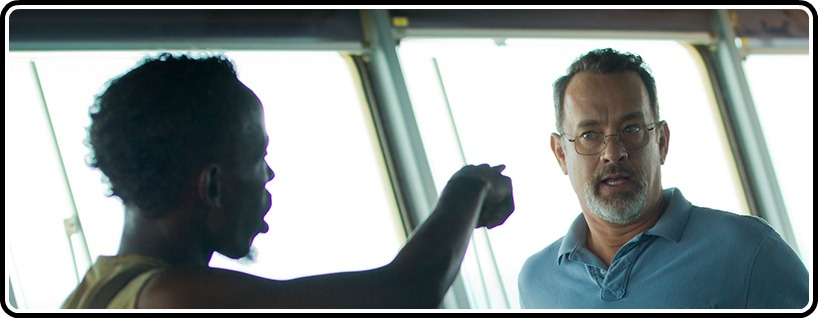
Director Paul Greengrass’ Captain Phillips recounts the harrowing real-life ordeal of the hijacking of the American shipping vessel Maersk Alabama by Somali pirates in 2009. The titular captain, here played with a masterfully stern intensity by go-to Everyman Tom Hanks—who should undoubtedly get any number of awards for best actor this year for the role—performs with an unrelenting level of natural courage that honors the factual events the film is based on but also adds an unswerving intensity that seems to impart the film’s plot with the very same sense of determination. The overall film is a powerful thriller that subverts the audience’s knowledge of real life events to tell a visceral and specific story about power and circumstance.
Despite the film’s title as its focal point, Greengrass’s fair treatment of both sides of the conflict is apparent from the beginning. We see Phillips in his minivan leaving his comfortable Vermont home with his wife and kids behind to ship off to Oman to command an American cargo vessel and then immediately switch gears to the sunburnt beaches of Somalia where stringy groups of men grasping AK-47s gather to raid the unsuspecting ships off the coast. There we’re introduced to Muse (played with an unpredictable rage and dangerous calm by newcomer Barkhad Abdi, who himself should get a supporting nom of some kind), who’s not the most powerful of the bunch but a man whose tenacity and sense of obligation will propel the situation inexorably forward. They are leaders whose lives are running parallel until the two intertwined stories abruptly clash. Before you know it the impossibly small group of pirates in a rickety skiff headed by Muse attempt to board the massive ship through shear will, and the David vs. Goliath story takes on a more focused matching-of-wits once the pirates attempt to take over.
The movie forces a fascinating juxtaposition between Muse and Phillips during the initial power struggle over command of the ship that continues to pervade the entire situation to its end. Who labels themselves as the captain, who has true authority, and who ultimately answers to whom? These are the questions at the forefront of the two worlds colliding. But Greengrass tends to keep the hostage situation at hand the main drive of the plot in the film’s first half, mounting tension as Phillips attempts to outwit the pirates using any means necessary, be it relaying messages to his hidden crew over a walkie-talkie or willfully leading the pirates to the wrong side of the ship to buy some time so rescue forces could possibly come bail them out. Greengrass’ trademark shaky cam is present once more, but it’s not nearly as annoying as people make it out to be since here it’s used as an ideal way to serve the cramped, anxiety-inducing scenes that could spiral out of control at any second. There’s a remarkable lack of action and deadly gunfire in the early scenes as Greengrass masterfully positions the threat of violence to be even scarier than actual force.
It’s during the cat-and-mouse game that we get simplistic slivers of information about what motivates Muse and his group, hinting conversely that he’s only doing it because his warlord boss told him to but also admitting on a humanizing level that resorting to these actions may have been the only way for him to succeed in any capacity whatsoever in his country. Later on when things get really hairy, Phillips challenges Muse by saying he could have made money as a simple fisherman in Somalia instead of getting them in this mess, but Muse cleverly chides back saying, “Maybe in America.” However the film doesn’t attempt to make any sweeping political statements because its focus is the personal confrontations between the men instead of striving to be some overambitious treatise on international struggles.
Phillips uses his bravery to secure the lives of his men, but in the film’s second half he soon finds himself in the ship’s lifeboat alone with the four pirates on a potentially one-way trip back to Somalia. The film’s drive then crawls to a bit of a halt that could have been tightened by a bit of trimming here and there. When it’s not along for the ride in the lifeboat the film unfortunately devotes its time to the scrambling military services organizing a rescue, presenting the very opposite of the intensely focused solitary story and losing some of the tension it spent the beginning of the film expertly building. Uniformed guys suit up and servicemen claw their computer stations with headsets on while screaming orders like it’s a Michael Bay movie, and you sit there just praying everything doesn’t fall apart. It’s not like these scenes are a blatant US Marines recruiting video, it’s just that they appropriate a lot of military-based realism that aren’t as significant in a post-Zero Dark Thirty cinematic frame. Thankfully the rescue operation eventually confronts the dangerous pirates who continually threaten Phillips’ life, and the stand-off culminates with two of the most evocative and jarring long takes I’ve seen in some time. I won’t spoil them here, but the scenes that Greengrass plainly lets play out are where Hanks’ performance truly shines, providing a sense of overwhelmingly authentic truth in the face of this terrible event for this one man.
Films based on true stories—specifically ones like this that deal with current events—are always suspect to the question of exploitation. Greengrass has tread this uneasy territory before with his 9/11 film United 93, and in Captain Phillips he directs this true story with an assured hand that simply and effectively makes us live through the experience to a fulfilling emotional release at the end. It’s a nail-biter of a film, one of the best broader-audience-focused studio films to come out in some time, and a great kick-off for the 51st New York Film Festival.


